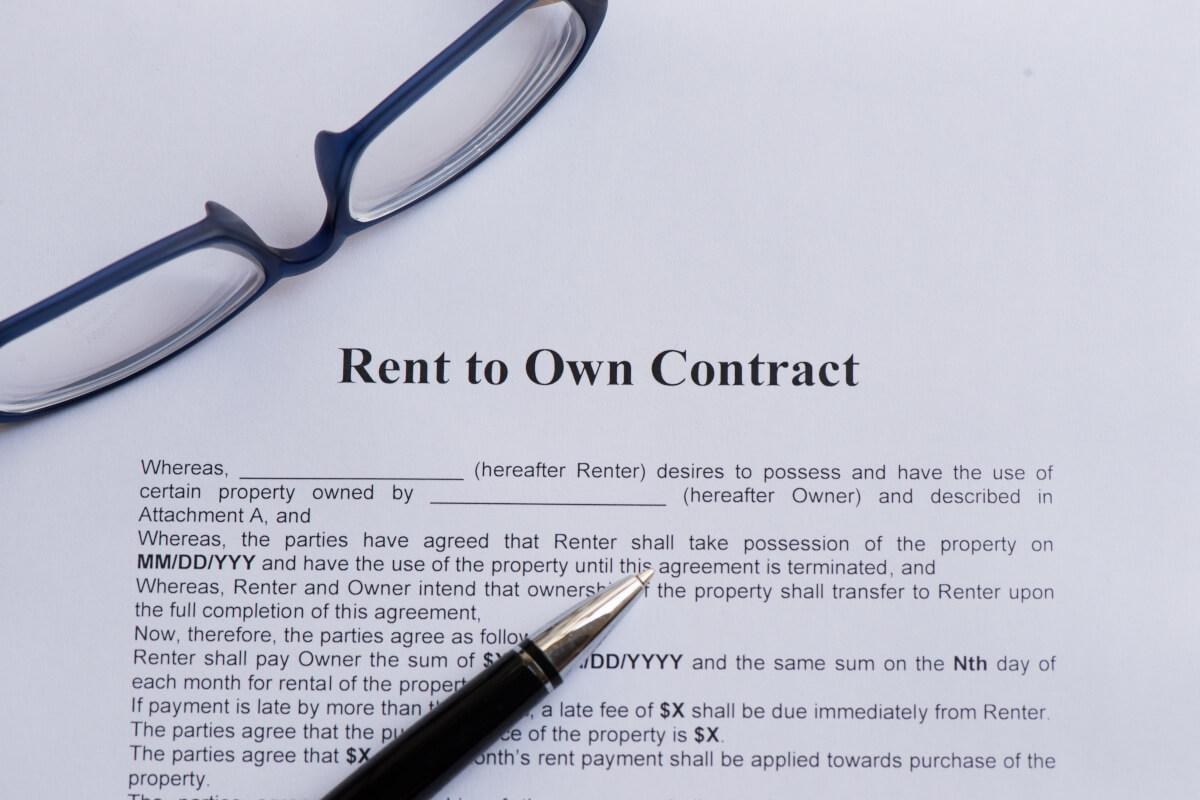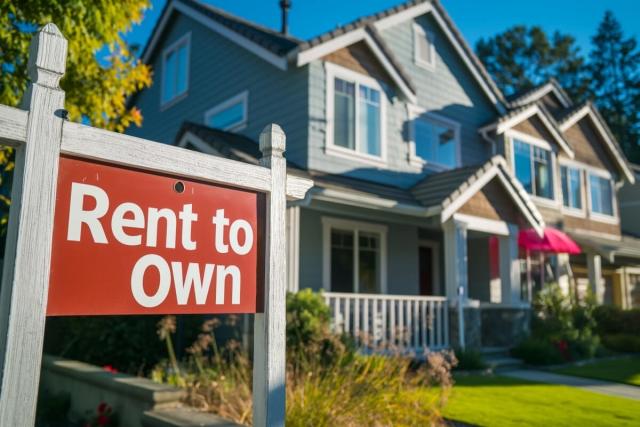Homeownership will always be a pillar of the American Dream. However, with economic changes and market fluctuations, fewer residents see this dream come to fruition. If you, too, feel that buying a home is out of reach, it may be time to consider some alternative routes, like a rent-to-own agreement.
In this article, we’ll explain what rent-to-own means, how it works, and if it’s the right decision for you. Here’s a preview of what we’ll cover:
- What is a rent-to-own agreement, and how does it work?
- What are the different types of rent-to-own agreements?
- Key factors to account for before entering a rent-to-own agreement
- How to minimize risks of rent-to-own agreements
- Rent-to-own alternatives to consider

What Does Rent-to-Own Mean?
A rent-to-own agreement is a type of rental contract that allows tenants to purchase a rental property before their lease expires. Similar to standard rental agreements, a rent-to-own contract outlines the lease duration, monthly rent amount, and any additional fees or terms. However, the document will also include a predetermined price and timeline for when a tenant can purchase a property.
How does the rent-to-own process work?
If you’re a longtime renter, you’re probably familiar with the regular leasing signing process. However, if this is your introduction to the rent-to-own agreement, allow us to explain how it works. In a nutshell, the rent-to-own process can be broken down into three simple steps:
- Initial Agreement: The landlord and tenant sign a contract outlining the terms of the rent-to-own agreement, including monthly rent, the duration of the lease, and potential consequences if either party violates the agreement.
- Rent Period: This next step occurs during the tenancy. During this time, the tenant pays their monthly rent along with an additional amount dictated by the rent-to-own contract. This additional payment goes toward a down payment or “option fee” that will be used to purchase the property at the end of the lease.
- Purchase Period: Once a lease is over, the tenant and landlord enter what’s called the purchase period. This is when the tenant has the option to purchase the property at the predetermined price outlined in the rental contract.
Let’s say you enter a rent-to-own agreement with a lease period of one to three years. At the start, you’ll typically pay an upfront amount—around three to five percent of the home’s purchase price—and agree to a monthly rent. On top of the rent, you’ll pay an additional amount designated for your future down payment, often held in an escrow account.
So, if the standard rent for the home is $1,500 per month, you might pay $1,800 instead. The extra $300 per month goes toward your down payment, which you can use when you buy the home at the end of the lease term. This payment arrangement is just one example of how a rent-to-own agreement can be structured. The specifics will vary depending on your specific type of rent-to-own agreement, which we’ll explore in the next section.

Types of Rent-To-Own Agreements
There are two types of rent-to-own agreements: lease option and lease purchase. Before entering a rent-to-own contract, it’s important to understand which kind of agreement you’re working with, as each has its own respective benefits and pitfalls.
Lease-purchase agreement
A lease-purchase agreement requires you to purchase the home at the end of the rental period. This type of agreement is legally binding, meaning if you decide not to buy the property, the owner can sue you for failing to fulfill the contract. It's important to understand this commitment before signing, as there is no flexibility to change your mind once the agreement is in place.
Lease-option agreement
A lease-option agreement, on the other hand, gives you the flexibility to decide whether to buy the home at the end of the rental period. You aren’t obligated to purchase the property and can walk away if you change your mind. However, there are some financial considerations—your initial payment of three to five percent, as well as any extra payments made during the lease, may be forfeited if you choose not to buy. Additionally, the price of the home is locked in when you sign the agreement. While this could benefit you if property values increase, it could also mean paying more than the home’s worth if the market declines.

What to Consider Before Entering a Rent-to-Own Agreement
While rent-to-own agreements are a great alternative to direct homeownership, they still carry quite a bit of financial weight. Before signing on the dotted line, make sure to look at things from all angles.
Are your finances in order? How is the local housing market? Do you see yourself living in this property long-term? Evaluating the following factors will help you answer these questions and determine whether rent-to-own is right for you.
Credit score and financial health
Because rent-to-own agreements require higher monthly payments and tighter financial commitments, it’s important to make sure your financial standings are adequate before entering one.
First, make sure you’re eligible for a mortgage loan once the lease ends. Consult with a mortgage lender to know exactly how much you'll need for the down payment and how much you'll qualify for. Taking this step early—before signing the agreement—can save you significant trouble later. If you wait until the lease ends to secure financing and discover you’re ineligible for a loan, you risk losing all the extra money you’ve paid toward the down payment.
Next, take the time to assess your credit status. If your credit score is low or nonexistent, the rent-to-own lease period offers a valuable opportunity to boost it, increasing your chances of qualifying for a mortgage when it's time to buy. To help improve your credit score, consider the following strategies:
- Pay bills on time: Consistently paying your bills on time is crucial for a strong credit score. Set up automatic payments or reminders to ensure you never miss a due date. This includes not just your rent but also utilities, credit card bills, and any other recurring payments.
- Reduce outstanding debt: Lower your overall debt, especially credit card balances. Keep your credit utilization below 30% by using less than 30% of your credit limit. Paying more than the minimum each month can help you tackle debt faster.
- Monitor credit reports: Regularly review your credit reports for errors or discrepancies that could harm your score. You're entitled to one free credit report per year from each of the major credit bureaus (Equifax, Experian, and TransUnion) through AnnualCreditReport.com. Dispute any inaccuracies.
- Be cautious with new credit accounts: Opening new accounts can temporarily lower your score due to credit inquiries. Only open accounts when necessary and focus on managing current credit responsibly.
- Keep old credit accounts open: The length of your credit history affects your score. Keep older accounts open, even if unused, to maintain a strong credit history.
- Use a secured credit card: If your credit score is low, consider using a secured credit card to help rebuild your credit. With a refundable deposit as your limit, responsible use and monthly payments can help rebuild your credit over time.
Market trends
Before entering into a rent-to-own agreement, make sure you’re aware of the current market trends in your area. Several factors, including interest rates and housing market fluctuations, can significantly influence both the appeal and the risks associated with rent-to-own agreements. As you review market trends, keep the following in mind:
Rising interest rates
As interest rates increase, the cost of borrowing becomes more expensive, which can deter potential homebuyers from traditional mortgages. In this context, rent-to-own agreements may become more attractive, allowing buyers to secure a purchase price while waiting for borrowing conditions to improve. However, it's essential to carefully evaluate the agreed purchase price in the contract, as shifting market conditions could impact its long-term value.
Housing market fluctuations
The housing market fluctuates because of changing economic conditions and the balance of supply and demand. In a thriving market, rent-to-own agreements can be a smart choice, especially if they lock in a purchase price below future market values.
On the other hand, if the market experiences a downturn, buyers might find themselves committed to purchasing a home at a price higher than its current market value. This is why careful market research and strategic financial planning are critical before committing to a rent-to-own agreement.
Supply and demand dynamics
Supply and demand can also impact rent-to-own agreements. In tight markets with limited housing inventory, rent-to-own can offer a competitive edge by securing a home without immediate full purchase. However, in markets with ample supply, traditional buying might offer better opportunities, making rent-to-own less advantageous.

How to Avoid Rent-to-Own Pitfalls
While rent-to-own agreements are a great alternative to traditional home buying, they do involve some risk. To avoid the potential pitfalls associated with rent-to-own homes, consider the following tips:
Consult a real estate agent or attorney
Before signing anything, consult a real estate agent and an attorney to safeguard your investment. Treat the process as if you're buying the home outright—get a thorough inspection and address any issues up front.
Check for foreclosure and liens
Ensure the home is not in foreclosure and verify there are no existing liens on the property. Be cautious of scams where property owners hide foreclosure statuses. In such cases, you could lose your deposit and monthly payments if the bank forecloses on the property.
Look out for hidden costs
Does the contract make you responsible for maintenance and repairs? In rent-to-own agreements, you might have to cover costs like fixing a leaking roof. Ensure maintenance responsibilities are clearly outlined in the contract. Also, check for HOA fees and clarify whether you or the owner will pay them until you officially own the home.
Be sure this is the right home
Rent-to-own agreements require a significant financial commitment. If you decide to walk away, you could lose all the money you've invested. If you're unsure, renting a more affordable home and saving for a traditional down payment might be a better option.
Rent-to-Own Alternatives to Consider
For those who find the rent-to-own process too risky, there are several alternative home-buying options worth exploring. These alternatives can provide more secure pathways to homeownership, often with additional financial support or creative financing options.
Government programs for first-time homebuyers
Various government-backed programs can assist first-time homebuyers in securing a home with little to no down payment. Programs such as FHA loans, VA loans for veterans, and USDA loans for rural properties offer more accessible lending terms. These programs often come with lower interest rates and reduced down payment requirements, making them attractive options for eligible buyers.
State and local assistance programs
Many states and municipalities offer grants, tax credits, and down payment assistance programs specifically designed for first-time buyers. These programs can provide significant financial support and incentives to make homeownership more attainable. Research the programs available in your area and see if you qualify.
While rent-to-own agreements offer a unique route to homeownership, they come with risks that should be considered. Before signing on the dotted line, thoroughly assess your finances, research your local market, and make sure you’re fully ready to commit to a long-term home. If you decide that long-term renting is more your style, rest assured there are still plenty of benefits and advantages to renting. With valuable resources and ample listings on Apartments.com, you can find the perfect rental home for your next chapter!
This article was originally published on February 23, 2017, by Alecia Pirulis.
FAQs
Is rent-to-own a good idea?
Rent-to-own can be a good option for those who want to buy a home but need time to save for a down payment or improve their credit score. However, it’s important to carefully review the contract terms and understand the potential risks before committing.
What is the disadvantage of a rent-to-own transaction?
One major disadvantage is that if you decide not to purchase the home, you may lose the extra money you paid toward the purchase. Additionally, the terms of the agreement can sometimes be unfavorable, such as having to pay above-market rent or being responsible for repairs as a tenant.
Can a landlord break a rent-to-own contract?
A landlord can only break a rent-to-own contract if the agreement allows it, or if the tenant violates the terms of the contract. If this happens, it’s crucial to consult legal advice to determine your rights and next steps.






